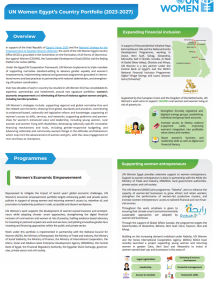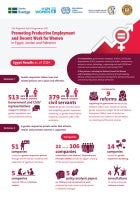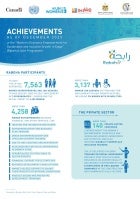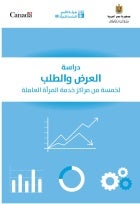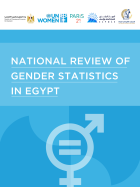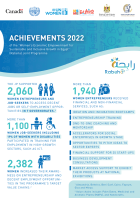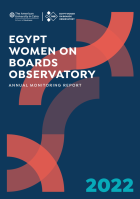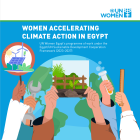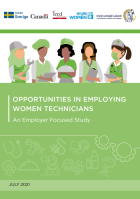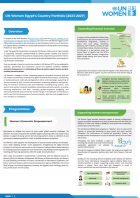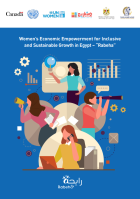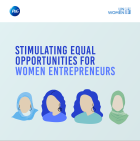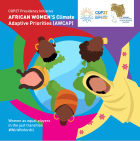1 - 20 of 62 Results
Pagination
Date:
This guidebook entitled “Designing a Gender Sensitive Mentorship Programme for the Workplace” aims to build the private sector’s capacity to be able to design and implement tailored mentorship programmes that ensure the equitable career progression of women workers.
Date:
This publication showcases the main results achieved in Egypt as part of the regional joint programme “Promoting Productive Employment and Decent work for Women in Egypt, Jordan, and Palestine” through voices from the field. This publication also highlights a number of actions that were carried out in Egypt to advance women’s access to decent work from 2019-2024.
Date:
This info-graph highlights the main results achieved in Egypt from 2019-2024 of the regional joint programme (JP) “Promoting Productive Employment and Decent Work for Women in Egypt, Jordan, and Palestine”.
Date:
“This info-graph highlights the main achievements of the Joint Programme entitled Women’s Economic Empowerment for Sustainable and Inclusive Growth in Egypt – known as “Rabeha” as of 31st December 2023. The Joint Programme is implemented by UN Women and UNIDO Egypt in partnership with the National Council for Women (NCW), the Ministry of Trade and Industry (MoTI) and the Micro, Small and Medium Enterprise Development Agency (MSMEDA) with the generous support of Global Affairs Canada (GAC).”
Date:
This study aims to propose a high-level strategy for the development of five selected working women's service centers, achieving a balance between preserving the social dimension and sustainability (i.e., financial and institutional sustainability). Under the leadership of the Ministry of Social Solidarity, this strategy is to be replicated throughout the country after its implementation in these governorates.
Date:
This manual is produced within the framework of cooperation between the Ministry of Social Solidarity and the UN Women Egypt. It aims to support the development of 44 women's service centers affiliated with the Ministry of Social Solidarity across 22 governorates.
Date:
As part of a collaboration between the Ministry of Social Solidarity and UN Women Egypt to support Egypt's care economy, this study focuses on two key sectors: Early Childhood Care and Education (ECCE) for infants up to pre-primary education, and Elderly Long-Term Care (ELTC) for those 65 and older.
Date:
The 2023 Women on Boards annual monitoring report analyzes data and tracks records for the representation of women on boards and senior leadership positions of the Egyptian Exchange (EGX) listed companies, the banking sector, the public enterprise sector, and the non-banking financial sector supervised and regulated by the Financial Regulatory Authority. The women on boards indicator have significantly improved to 23.3% in 2023 from 19.7% in 2022. This sixth edition sustains the average 3% annual increase pattern achieved over the past four years. This steady progress suggests that participating companies are on track to meet the 2030 strategy goal of 30% women on boards by 2026.
Date:
The “Gender Responsive Budgeting Procedural Manual” aims to promote fairness and equity between women and men by optimizing the use of government financial resources, achieving efficiency and effectiveness in budget allocation and spending, ensuring equal opportunities and gender equality, and promoting social justice in public finance.
Date:
As part of the Government of Egypt’s development of the National Strategy for the Development of Statistics, a national review of gender statistics in Egypt was carried out. The report of the National Review of Gender Statistics subsequently examines three key components of gender statistics in Egypt: creating an environment that enables data collection, improving data production, and enhancing accessibility and usage.
Date:
This infographic highlights the main results achieved under the “Women’s Economic Empowerment in Egypt” programme between July 2021 till August 2023. This programme is implemented by UN Women Egypt in partnership with the National Council for Women (NCW), the Ministry of International Cooperation, and the Ministry of Labour and is generously supported by KOICA Egypt.
Date:
This info-graph highlights the main 2022 achievements of the five-year Joint Programme entitled Women’s Economic Empowerment for Sustainable and Inclusive Growth in Egypt – known as “Rabeha”. The Joint programme is implemented by UN Women and UNIDO Egypt in partnership with the National Council for Women (NCW), the Ministry of Trade and Industry (MoTI) and the Micro, Small and Medium Enterprise Development Agency (MSMEDA) with the generous support of Global Affairs Canada (GAC).
Date:
The 2022 Women on Boards Observatory annual monitoring report analyzes data and track records for the representation of women on boards and senior leadership positions of the Egyptian Exchange (EGX) listed companies, the banking sector, the public enterprise sector, and the non-banking financial sector supervised and regulated by the Financial Regulatory Authority. The women on boards indicator have significantly improved from 16.7 percent in 2021 to 19.7 percent in 2022.
Date:
Under the UN Sustainable Development Cooperation Framework (2023-2027), this business case highlights UN Women Egypt Country Office (ECO) on-going contributions and emerging partnerships to accelerate Egypt’s climate action by increasing the access of a diverse range of women to decent employment in agriculture, renewable energy, and science, technology, engineering and math (STEM)- related sectors.
Date:
By absorbing more than 52% of young people at the secondary level (43% of which are females), technical secondary education represents the larger part of the Egyptian educational system. Despite this, statistics on labour force participation for technical and vocational education and training (TVET) graduates show a high rate of unemployment with 46.4% outside the labour force (18.7% men and 81.5% women). This study uses a gender lens to assess the technical jobs that are currently available to women technicians. It also seeks to identify the various challenges and opportunities for women technicians’ employment by assessing the current demands and perceptions of employers in terms of women’s skills and limitations.
Date:
The UN Women Egypt Country Office’s Country Portfolio Brief gives a comprehensive overview on the main programmes implemented by UN Women during the period from 2023 to 2027 in support of the Arab Republic of Egypt’s Vision 2030 and the National Strategy for the Empowerment of Egyptian Women (NSEEW).
Date:
The main goal of the JP is to support the economic empowerment of more than 6,300 women through increased access to employment and/or self-employment opportunities through extending a tailored package of demand-driven services to different actors in the Egyptian labour market by providing pathways for capacity-development and growth to women jobseekers, women entrepreneurs, private sector companies and investors, in collaboration with government institutions and prominent partners.
Date:
The UN Women programme was launched in 2013 in partnership with the National Council for Women (NCW) as the main coordinating government counterpart. In 2015, the programme expanded to five governorates: Cairo, Giza, Alexandria, Minya and Beni Suef.
Date:
The “Stimulating Equal Opportunities for Women Entrepreneurs” brochure summarizes the results of the strong partnership between UN Women and Procter and Gamble (P&G) that started in 2017 in support of women’s economic empowerment in Egypt and promote greater diversity and inclusion through equipping women entrepreneurs with the skills and support they need to access opportunities as potential suppliers and distributors. Women received trainings on business development, marketing, sales techniques, financial management and soft skills. Afterwards, selected women obtained funding to establish their own private business in the retail industry with many being integrated in the distribution channel of many large corporates including P&G, Juhayna, and Mars.
Date:
On the Gender Day at the Twenty-seventh session of the Conference of Parties to the UN Framework Convention on Climate Change (COP 27), the Government of Egypt, as COP27 Presidency, launched the African Women’s Climate Adaptive Priorities (AWCAP) initiative. This initiative aims at driving change by increasing decent work and leadership for women in green sectors, increasing women’s representation in STEM fields, and leveraging increased national investments for women-led green businesses.
